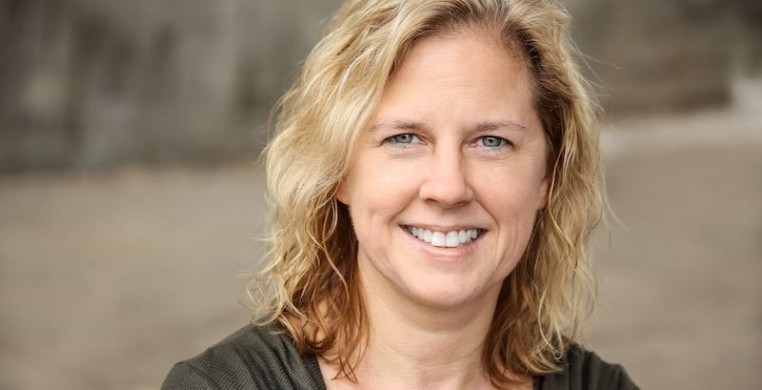Margi Cole has moved to Alabama after 26 years at the Dance Center of Columbia College Chicago. Cole hails from Springfield but spent most of her career thus far in Chicago. She’s a 1990 graduate of the Dance Center and earned her MFA at the University of Illinois – Urbana-Champaign before settling in Chicago. Cole joined the Dance Center faculty in 1995, starting her company, The Dance COLEctive, a year later.
This fall, Cole will start a full-time position in Birmingham, Alabama as one of four dance faculty members teaching approximately 50 students at the Alabama School of Fine Arts. It is familiar territory; Cole met Wes Chapman, ASFA’s dance chair, when she was 15 years old and a student at the school. She has strong ties to arts organizations across the state, including Alabama Ballet.
Known for her quirky style and steadfast consistency, Cole is a mainstay at the Dance Center. But her classes have rarely, if ever, been guaranteed. “For the past 30 years I’ve always had at least three part-time jobs,” Cole said. Over the years, she took on additional responsibilities at the Dance Center, including a stretch as associate chair and a role supporting the Dance Presenting Series. She’s served on boards (including that of See Chicago Dance) and countless committees.
With fluctuations in enrollment and curriculum changes at the Dance Center (plus a global pandemic thrown into the mix), Cole was attracted to the stability of a full-time job and will be teaching modern dance for students in grades 7-12. “Teaching is my passion and all of these other things have helped keep my life glued together,” she said.
During the pandemic, Cole focused much of her energy on sifting through the Dance COLEctive archives, culminating in a series of virtual watch parties and a social media campaign commemorating the company’s silver anniversary. “It has been pretty cathartic,” Cole said, to work through decades of costumes, photographs, programs, videos and press clippings. “I’m not done with it,” she said. “I have a pile of stuff that will probably have to be put in a box. But I whittled everything down to a folder for each year. It’s a librarian’s dream.”
The pandemic also tested Cole as a teacher. “I can’t even begin to tell you what I learned and how much compassion I have for the young people who had the wherewithal to show up,” she said. “Twenty-five years of teaching couldn’t prepare you for a year and a half of teaching on Zoom.”
Run out of a rinky-dink space near the corner of Lawrence Ave. and Sheridan Rd. (luxurious for its time), Columbia College’s dance department was quite clearly an extension of its founder, Shirley Mordine, when Cole arrived there as an undergrad in the late 1980s. Generations of dancers, taught from the Dance Center's present home in the South Loop by Cole and her contemporaries—including several faculty who were influenced by Mordine’s iconoclastic teaching methods and modern dance aesthetic as members of her professional company—tie the Dance Center indelibly to its matriarch. After Mordine stepped down in 1999, subsequent chairs (Bonnie Brooks, Onye Ozuzu, Peter Carpenter and Lisa Gonzales) have wrestled with the complicated task of preserving the Dance Center’s legacy while moving toward necessary change. It’s resulted in a muddled identity despite positive outcomes.
“The Dance Center is trying to respond to the field of dance at large by not privileging particular forms, opening the door for other forms to be elevated,” Cole said. “In the beginning, I was resistant to it. The artform that was the central focus was not central anymore, which made me less relevant. But I think it’s all necessary and, in hindsight, I can see how it has a really positive impact on the students.”
The Dance Center’s concerted efforts surrounding diversity, equity and inclusion began approximately 10 years ago, well before many of their institutional peers. “Lots of people have had a light shined on them around this work,” Cole said. “Our department has been doing it and it hasn’t been elevated as an example in a public forum.”
Cole purports that the Dance Center’s approach has always been inclusive. Columbia College’s open enrollment policy makes it possible for almost anyone to pursue dance training who wants it. The Dance Presenting Series is another example. “If you look back at the 47 years of presentations and look at the rosters, Shirley was forward-thinking,” Cole said. In essence, loosening the grip on Mordine’s aesthetic is aligned with her vision from the get-go.
True to form, Cole’s decision to leave is not purely about her, though she's excited about the stability it will afford her. “I feel like the field needs to change—I need to change,” she said. “What better place to have an impact then to start sooner in a young artist’s trajectory? If a young dancer can be thinking about doing ballet and modern and yoga, but also be thinking about decolonizing dance—maybe it could impact the field faster.”
In addition to teaching at ASFA, Cole plans to continue The Dance COLEctive in Birmingham. In 2016, she disbanded the ensemble, opting to focus on solo works. In large part, it was a pragmatic decision that allowed her organization to be flexible enough to accommodate a move. Though that move has finally come to pass, Cole hopes to remain connected to Chicago. But with an equal mix of excitement and fear, she feels fortunate for the fresh start.
“How lucky am I to be in the middle of my life and get start over?”


